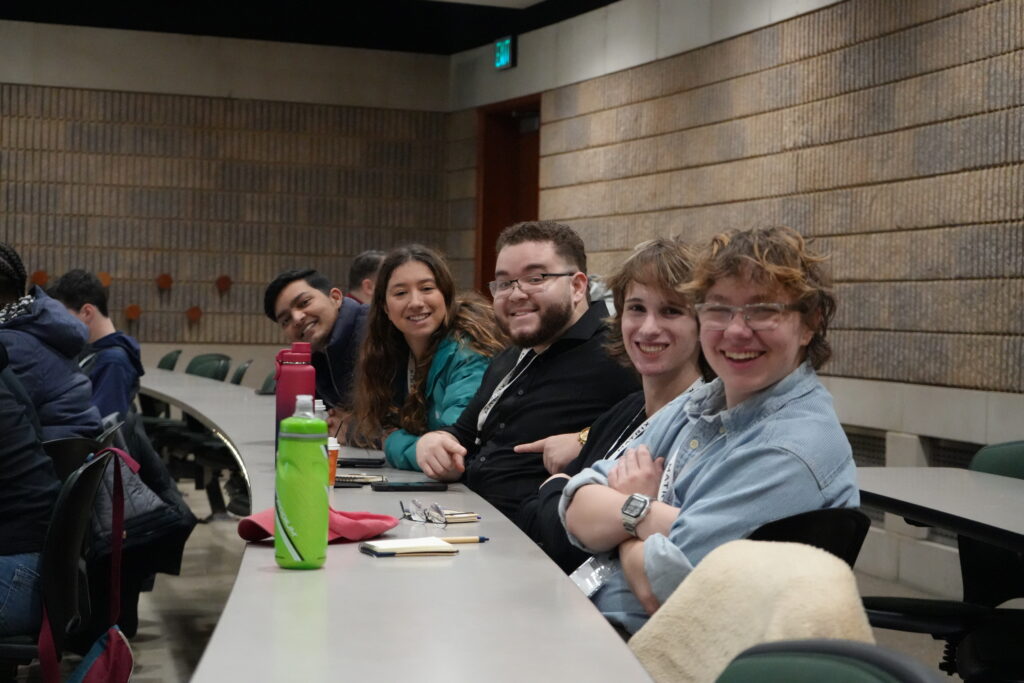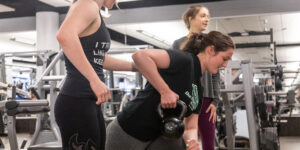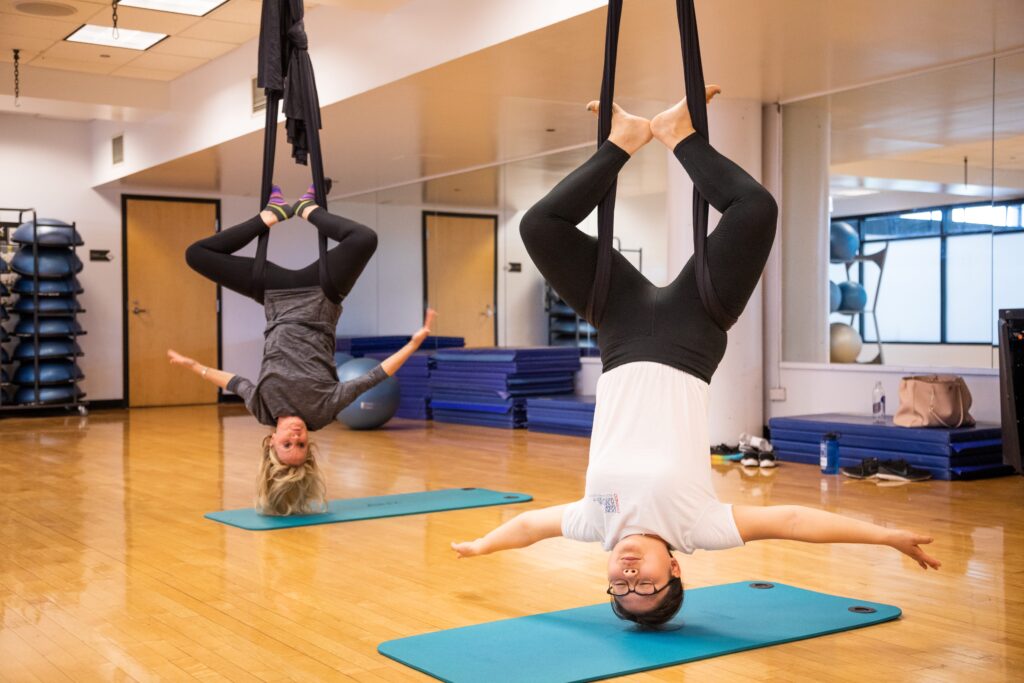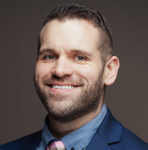A student-first outsourced model drives well-being and revenue
A flexible, student-centered approach to recreation and wellness is helping DePaul deepen its mission, strengthen the student experience, and stay nimble in a competitive urban environment.
Gen Alpha and Student Well-being in Higher Education
 A new generation of students (Gen Alpha) is beginning to enter the higher education world, thinking about career pursuits, college degrees, and what campus life will be like. When it comes to the latter, students are looking for wellness resources and holistic support more than ever.
A new generation of students (Gen Alpha) is beginning to enter the higher education world, thinking about career pursuits, college degrees, and what campus life will be like. When it comes to the latter, students are looking for wellness resources and holistic support more than ever.
What started with Gen Z shows no signs of changing anytime soon. Student well-being remains a key institutional priority throughout higher education. This is true of institutions regardless of their size, setting, background, or history. It is also true that recreation and wellness, which require expertise in many disciplines, can be an overwhelming challenge to administer well. Institutions need fresh ideas and creative revenue strategies, while still delivering on student expectations. This is where the right outsourced partner can be a game-changer.
DePaul University and CENTERS: A 25-Year Campus Recreation Partnership
DePaul University, an urban Catholic institution in the heart of Chicago, is no stranger to navigating the complex nuances and demands of wellness outcomes on campus. In fact, recreation and wellness at DePaul thrive in their support of broader university goals around student success, equity, and belonging. But in a dense urban setting with limited space and evolving student needs, delivering on those goals takes creativity, leadership, and strategic alignment.
For more than 25 years, DePaul has partnered with CENTERS to manage and operate the Ray Meyer Fitness and Recreation Center, otherwise known as “The Ray”. What began as a facility launch has become a long-standing, mission-aligned collaboration that continues to adapt with the university. According to Scott Vandermoon, Director of Campus Recreation, the relationship with CENTERS has helped DePaul remain responsive, inclusive, and efficient amid shifting expectations, priority changes, and a growing need for wellness support on higher education campuses.
How The Ray Meyer Fitness & Recreation Center Generates Revenue and Enhances the Student Experience
The Ray is a key university asset that CENTERS manages not only for student benefit but also as a reliable revenue source. Located in Chicago’s Lincoln Park neighborhood, The Ray offers amenities uncommon in most urban gyms, including a pool, indoor track, and four basketball courts. “We may not offer the boutique vibe, but we offer a high-quality experience plus all the extras. That ‘plus’ is our advantage,” says Vandermoon. These features help attract between 2,500 and 3,000 non-student members each month. The Ray also hosts several long-standing community partners and programs, including an eight-week urban youth summer day camp, transforming underutilized hours into steady revenue.
What sets this model apart is how external revenue directly supports student affordability. Funds from rentals help offset operational costs, allowing many student programs, including intramural sports and group fitness classes, to remain free. This approach aligns with DePaul’s mission of accessibility, particularly important for a diverse and often first-generation student population. By tapping into external interest without compromising student access, The Ray balances financial sustainability with inclusion.
Flexible Spaces and Programs That Adapt to Student Needs
CENTERS also keeps the facility adaptable, reconfiguring spaces based on demand. Studios have been turned into weight rooms or niche areas like instructional kitchens and aerial yoga spaces. The facility’s class lineup is equally flexible, offering beginner classes like Beginner Adult Ballet and Recovery Yoga to more advanced ones, such as Circuit Training and Run Strong, a marathon training program. These targeted programs not only appeal to a broader demographic but also support community engagement and drive diversified revenue. This flexibility allows The Ray to serve changing campus needs while remaining attractive to external users. The result is a dynamic model where space, strategy, and mission come together to support students and generate value for the university.
The CENTERS Outsourced Management Difference in Campus Recreation
 DePaul’s recreation and wellness presence is embedded in the fabric of campus life and the community. CENTERS staff participate in student orientation, serve on health promotion task forces, and collaborate across student affairs functions. As Scott affirms, “We don’t just run a building. We’re part of the student experience.”
DePaul’s recreation and wellness presence is embedded in the fabric of campus life and the community. CENTERS staff participate in student orientation, serve on health promotion task forces, and collaborate across student affairs functions. As Scott affirms, “We don’t just run a building. We’re part of the student experience.”
This integration reinforces a broader goal: to position recreation as a site for learning, leadership, and inclusion by removing barriers to access and participation. This is evident in small policy shifts, like using inclusive language on signage and incorporating diverse representation in marketing. It is also apparent in larger-scale efforts and prominent programming like Women on Weights—a strength training initiative that has driven greater participation among female students and community members. Additional programs like Balance Training and Tai Chi extend accessibility across age groups, further embedding the center as a wellness hub that serves both campus and community.
Programmatically, CENTERS enables a highly customized approach that uniquely fits and supports DePaul’s mission, student population, and campus dynamics. From Reformer Pilates and Aerial Fitness to customized wellness programs like Fit by Design and Play by Design, the team co-creates experiences that meet students and members where they are socially, physically, and developmentally.
Outsourced Management Advantages: Staffing and Operational Support
CENTERS also brings strategic infrastructure that can streamline processes, resulting in crucial time savings. When inevitable staff turnover occurs, CENTERS can review, approve, and post positions within a week or two, minimizing gaps in operations and expertise. Rapid staffing keeps the recreation and wellness experience consistent and stable. Even more valuable is the professional peer support: “We have a deeper, more conversational learning community [amongst CENTERS client teams] than what you’d get from national message boards. It’s colleagues helping colleagues in real time.”

Case Study: Outsourced Campus Recreation Delivers Results at DePaul
The DePaul-CENTERS partnership model is not only agile, but it also delivers results.
Maximizing a University Asset
Located in the heart of Lincoln Park, The Ray Meyer Fitness and Recreation Center benefits from a highly accessible and vibrant neighborhood setting. This prime location enables CENTERS to generate meaningful revenue for DePaul University through a variety of channels, including community memberships, facility rentals, and fee-based programs. By attracting local residents, alumni, and visitors in addition to students and staff, The Ray serves as both a campus resource and a revenue-generating asset that supports the university’s broader mission.
Woven into the University Fabric
Although outsourced, the site team at DePaul is fully integrated into the university community. Full-time staff manage student employees and oversee procurement processes in alignment with university protocols. The team actively collaborates with campus partners such as the Career Center, Office of Health Promotion & Wellness, and the Office of Student Involvement. The team also serves on task forces and embeds DePaul’s Vincentian mission into its programs, policies, and staff training efforts.
Weights for Everyone
By converting a fitness studio into a dedicated strength training space, the team has created a supportive weightlifting community where new users or those looking for private space can build confidence and strength in a sometimes-uncomfortable space. This has fostered a more welcoming gym environment that has increased participation and usage among women and new users. Strength training plays a critical role in supporting bone density, mobility, and long-term health—especially for women and older adults—making it a powerful tool for both prevention and lifelong wellness. As interest in inclusive, strength-based programming grows, the space is helping attract and retain a broader range of participants.
Fit by Design
The team at DePaul offers customizable wellness experiences through a variety of a la carte classes, wellness services, and team-based activities tailored to student orgs, campus departments, and community groups. The program removes barriers and enhances social connections through movement. The program served more than 30 organizations and audiences in FY25, including varsity tennis, staff council, Information Services full-time staff, resident assistants, orientation leaders, and numerous student organizations.
Mission-Driven Policy Shifts
Accommodating facility policies, accessible (free) intramural and group fitness programs, inclusive messaging, and diverse representation in marketing have fostered a more welcoming and less intimidating environment for new participants. As a result of these and other similar efforts, student usage has returned to pre-pandemic levels, and community memberships are at an all-time high.
Creative Revenue Generation
Like many other institutions in the wake of COVID-19, DePaul had to rethink its operational model to meet shifting wellness expectations. Students and community members were seeking holistic, adaptable experiences that supported both physical and mental well-being. In response, the team at The Ray launched new hybrid program structures and diversified offerings like Reformer Pilates, aerial classes, and wellness workshops that catered to different comfort levels and interests. These changes met evolving needs and opened up new revenue channels that now help subsidize core student programs. Themed class variations, such as Vinyasa and Hatha yoga, Zumba®, JAM Dance Fitness, and Dance! Beginner Jazz Funk, continue to attract a mix of student and non-student participants, reinforcing The Ray’s position as a creative and inclusive fitness destination. And because CENTERS operates sites nationwide, DePaul benefited from tested strategies and shared insights from peer institutions, turning cross-campus learning into real-time innovation.
Why Outsourced Campus Recreation Management Works: Lessons from DePaul
As CENTERS’ original partner institution, DePaul offers a blueprint for what outsourced campus recreation can become: strategic, inclusive, student-centered, and mission-aligned. “What sets CENTERS apart is their ability to be problem solvers. They don’t just offer a template. They listen to what the institution needs and craft a plan around that.”
For colleges and universities facing constrained budgets, staffing limitations, shifting student expectations, or changing institutional priorities, the DePaul-CENTERS model offers a tested and successful path forward. As Scott puts it: “CENTERS is the easy button—but we’re also the excellence button.”
About the Contributors
 This article was written by Matt Schmiedl, with insights from Scott Vandermoon, Director of Campus Recreation at DePaul University.
This article was written by Matt Schmiedl, with insights from Scott Vandermoon, Director of Campus Recreation at DePaul University.
Matt Schmiedl serves as Enterprise Marketing Manager for CENTERS, providing strategic marketing support across multiple managed sites. He began his CENTERS career at Cleveland State University in 2013, where he led marketing for University Recreation and Wellbeing and developed the “CSU Rec” brand. With more than a decade of experience in higher education marketing and nine NIRSA Creative Excellence Awards, Matt specializes in strategies that grow engagement, community impact, and revenue. He also chairs the CENTERS AI Council and is a frequent contributor to Campus Rec Magazine.

 Scott Vandermoon
Scott Vandermoon